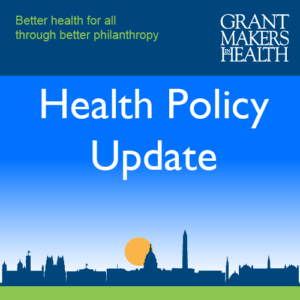Health Policy Update: April 17, 2025
In an effort to help our Funding Partners better understand the changing health policy landscape in the new administration and Congress, Grantmakers In Health (GIH) is expanding the GIH Health Policy Update newsletter to three issues per month. Working in collaboration with Leavitt Partners, a leading health care policy consultancy, we are adding new installments of the newsletter on the first and third Wednesdays of the month, while we will continue to partner with Trust for America’s Health on the installment released on the second Wednesday of the month.
Strengthening the Public Health System for a Healthier Future
Based on a November 2002 Issue Dialogue, this Issue Brief examines the nation’s public health infrastructure and explores opportunities for grantmakers to strengthen and sustain this fragile and troubled system. The report provides and overview of the nation’s public health system and its infrastructure weaknesses. It also discusses the challenges faced by state and local public health agencies as they struggle to maintain and improve the health of the public while simultaneously preparing for the possibility of bioterrorism. Finally, the report looks at foundation strategies to help buttress the public health system’s infrastructure.
Turning the Tide: Preserving Community Mental Health Services
Across the country, the demand for community mental health services is growing at the same time that community mental health programs are in crisis as a result of inadequate financing and a shortage of appropriately trained providers. Nationwide, the imbalance between the supply of and demand for community mental health services is causing unnecessary personal suffering and imposing avoidable societal costs. This Issue Brief explores how health grantmakers can support community programs that provide critical mental health intervention and treatment services to children and adults.
Building Relationships in Health: How Philanthropy and Government Can Work Together
Philanthropy and government have many mutual interests. While differences in culture, time frame, and expectations can make building relationships difficult, there are many successful partnerships that together are greater than the sum of their parts. This publication presents what GIH has learned from colleagues in both sectors about the range of options for those interested in collaboration and the lessons they have learned in building those relationships.
Positive Youth Development: A Pathway to Healthy Teens
Adolescence is the time when teens are laying the groundwork for their future health and well-being. This Issue Brief explores how grantmakers can apply youth development principles and asset-based strategies to their grantmaking to promote healthy development and healthy decisionmaking by the adolescents in their communities.
Rx for Progress: Putting Patient Safety Into Practice
This Issue Brief, based on a February 2002 GIH roundtable meeting, explores the work of foundations, government, research, and health care organizations to reduce medical errors and improve patient safety. The report draws on both foundation and grantee experiences and highlights specific funding strategies, as well as emerging opportunities for foundations that wish to fund patient safety programs and research.
Examining E-Health
Based on a 2002 GIH roundtable meeting, this Issue Brief is intended to help health funders better understand the fluid and dynamic world of e-health.
The report profiles the work of three foundations active in e-health: California HealthCare Foundation, The Robert Wood Johnson Foundation and the Tides Foundation. Their work illustrates the range of foundation activities related to e-health, including: providing leadership both within communities and at the state and national level, including stakeholder convenings, developing a better IT infrastructure within health care; unding research and development of new applications; improving technology literacy among patients and providers and providing technical assistance to potential users; enhancing privacy and security; supporting demonstration projects, evaluations, and quality measurement; acting as a catalyst for partnerships and collaborations; developing and disseminating tools, research, and best practices; and monitoring e-health activities.
Y2K and Health Care
Written just prior to the year 2000, this Issue Focus discusses the potential impact of the Y2K problem and its effect on the delivery of health care, especially to vulnerable populations. It also explores philanthropy’s role at the local, state, and national levels to help mitigate these predicted problems.
Join & Become a GIH Funding Partner Today!
Click here to learn more about becoming a GIH Funding Partner and joining the largest national network of health funders.

